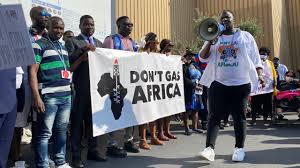THE NGO’s led by Environment Governance institute, the undersigned environmental and human rights civil society organizations working to promote environmental conservation, human rights observance reached out the 30th Afreximbank Annual General Meeting that took place between 18th – 21st June 2023 to address a matter of utmost importance, concerning environmental sustainability and the vital role that financial institutions play in addressing the climate crisis in Africa.
During the AGM, they emphasized the urgent need for stronger environmental commitments and actions within the financial sector. The impacts of climate change are increasingly evident across the continent, with vulnerable communities and ecosystems bearing the brunt of these effects, and yet
financial institutions such as Afreximbank have continued to invest in the further expansion of fossil fuel projects, thus accelerating the climate emergency.
Specifically, they said they have noted with great concern that across the region, Afreximbank has continued to support or finance fossil fuel projects, which
contravenes and affects the environment.
“We urge you, similarly to other governments worldwide that signed the COP26 Statement on International Public Support for the Clean. We as well call for the immediate attention of Afreximbank to immediately stop all the projects that distract the environment in Africa”. Asks the NGOs stakeholders.
NGO’s further highlighted some of the problematic fossil fuel projects Afreximbank supported recently: – In 2021, Afreximbank approved $1.04 billion to the Nigerian National Petroleum Corporation (NNPC) for petroleum exploration activities.
This decision faced strong opposition from civil society organisations and local communities due to serious environmental concerns. – In July 2022, Afreximbank signed a project preparation facility financing agreement to advance the floating liquefied natural gas project in Nigeria, with a capacity of 1.2 million metric tons per annum.
They emphasised that this project does not align with the commitments made during COP26, as it promotes the use of gas, which remains a significant contributor to greenhouse gas emissions and is not considered a transition fuel.
In October 2022, Afreximbank signed a $635 million reserve-based facility term sheet with Amni International Petroleum Development Company. The primary purpose of this funding is to support the capital expenditure required for two oil and gas fields in Nigeria, with the goal of doubling oil production from approximately 10,000 to 25,000 barrels per day.
In August 2020, Afreximbank committed $400 million to the Mozambique LNG project. This project is surrounded by and has been linked to extreme violence in the province of Cabo Delgado.
Also, the project will not increase energy access for communities but will escalate human rights violations as well as increase greenhouse gas emissions. – In October 2022, Afreximbank approved $200 million towards the financing of the East African Crude Oil Pipeline.
This pipeline has been highly controversial due to its actual and potential environmental and social impacts, as well as its contribution to the climate change emergency.
The above-mentioned projects have had significant socioeconomic impacts, including land grabbing, displacement, loss of livelihoods, increased poverty, and gender- related issues such as teenage pregnancies and gender-based violence.
Local conflicts, militarization, and growing instability have also been observed, indicating the adverse consequences of these projects. The environmental impacts resulting from these projects have equally affected communities in and around the project areas.
These impacts include land and water pollution, biodiversity loss, and 3 the disruption of vital ecosystems. Such environmental degradation directly contributes to undermining the progress towards achieving the Sustainable Development Goals (SDGs), particularly SDGs 1, 5, 8, 10, 14, 15, and 16. We firmly believe that financial institutions like Afreximbank have a significant responsibility to support sustainable development and contribute to climate change mitigation.








